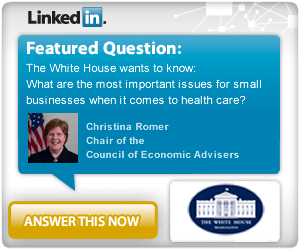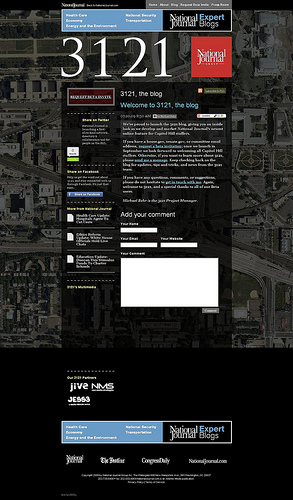I have a piece up at Politics Daily on Helen Thomas, published yesterday shortly after Helen’s retirement was announced. Yes, I know her remarks were offensive and antisemitic and I don’t defend them. But I don’t think she deserved to be forced into retirement for speaking her opinion when her job is to be an opinion columnist. She issued an apology, as most opinion columnists do when they say something stupid. If you’re interested, the full piece is here (my first piece in Politics Daily!).
Archive for the ‘politics’ Category

2010 Campaign Coverage Already Reaching Obsessive Levels
February 12, 2010originally published at Mediaite.
Here in the snow-submerged city of Washington, DC, the few people that have been able to dig themselves out from under four feet of snow have been feverishly keeping America stocked with more 2010 campaign coverage than ever.
In the past couple of weeks, as the nation was riveted by primaries in Massachusetts and Illinois, mainstream media and the blogosphere have begun the race to ramp up their 2010 coverage. The New York Times, Politico, and Talking Points Memo are just a few of the media outlets that have stepped up their game in 2010 coverage recently. One wonders if, given the fact that we’re still nine months away from the general election, we all might reaching new heights of campaign obsession.
On February 1, just in time for the Illinois primaries, Politico launched its new 2010 Campaigns page, conveniently located at politico.com/2010. The page is boasting “Full 2010 Election Coverage and Political News” and is like porn for the political junkie. Features include: daily “Morning Score” email updates, maps and calendars encompassing every House, Senate, and gubernatorial seat up for grabs, a Polling Center featuring daily updates on the latest polls on nearly every 2010 midterm race, an aggregated Twitter feed of Politico’s reporters, and in-depth analysis on “races to watch.”
The Caucus, the political blog over at the NYT, also announced yesterday their plans to intensively track the 2010 campaigns over the next nine months, over at elections.nytimes.com/2010. The most prominent feature of this is a set of interactive maps of every House and Senate race in the country and a handy primary calendar.
Talking Points Memo also debuted yesterday their new Polltracker (beta!), which aggregates all the latest polling data from around the country, and even allows the truly dedicated the option of receiving a constant live feed of poll results via Twitter. Of course, no news site is complete without a Twitter account now, since that’s where all the breaking news happens!
The Electoral Map, a political geography blog, is one of the many blogosphere voices ramping up their 2010 coverage as well. TEM blogger Patrick Ottenhoff has been adding additional frequent posts on 2010 coverage, and supplementing it with a Flickr gallery of maps, a Twitter feed of breaking news and updates, and weekly posts on the state of the midterm campaigns.
In DC this is standard during an election year, and I admit I’ve been glued to 2010 coverage myself ever since the Coakley-Brown election started heating up. But is coverage maybe reaching obsessive levels? Why do I feel like a crack addict, going from one primary race to the next? Is there ever such a thing as too much up-and-down election coverage? I’m a true election nerd, but even I feel that election burnout may be looming in the future for some.
Most of all, I worry that the real policy issues of our time – jobs, the recession, two wars, and oh, yeah, that healthcare bill! – are being pushed to the backburner in favor of our collective obsession over the latest campaign gaffe. But if we’re all contributing to it, I don’t see this question being answered anytime soon.
In the meantime, there’s a new WaPo poll out today. You’re welcome.

Weekly Standard still trying to convince us Obama is Arab
June 3, 2009President Obama arrived in Saudi Arabia this morning (click here for a really breathtaking picture of his arrival). He met with King Abdullah. And then, in what would normally be appreciated by most as a gesture of cultural understanding, respect, and open-mindedness, Obama said: “Shukran.” That is the Arabic word for thank you. It’s like the first word we learned in Arabic 101 (and yes, full disclosure, I studied Arabic for years).
But that doesn’t stop the Michael Goldfarb over at conservative mag the Weekly Standard from whipping out the fear-mongering:
It seems there is some legitimate confusion on just what languages Obama speaks, and as far as Arabic, the only real hint has came from Nick Kristof, who heard Obama recite the Muslim call to prayer in Arabic and with a “first-rate accent” back in 2007. With even the White House now smearing Obama as a Muslim, one wonders if the president hasn’t been concealing some greater fluency with the language of the Koran.
Really? The President says one word in Arabic, and Goldfarb is trying to insinuate that the President is a secret Arabic speaker, and possibly even a Muslim when he tucks in that Koran reference at the end of the post. Oh no, what did we get ourselves into! We elected a secret Arabic speaker!
The problem with the Weekly Standard here is twofold. First and foremost, there’s the obvious issue that being able to say “thank you” in a foreign language does not by any stretch of the imagination mean the person in question can speak that language. Especially when the language is Arabic, a language so difficult to learn that one can spend years studying and still not be proficient in conversation. It’s a ridiculous correlation to make. And Nick Kristof is hardly a judge of whether Obama has a “first-rate” Arabic accent. NO one who is a native English speaker develops a first-rate Arabic accent just like that. It’s more difficult than you might imagine.
Second is the problem that Goldfarb, like many conservatives, is once again using the Muslim Smear. Once again, they’re implying that speaking Arabic or being Arab or being a Muslim are negative, un-American, un-welcome traits in America. Once again, they’re trying to instill fear in the hearts of Americans who still are wary of Muslims in the post-9/11 era.
Doesn’t it ever get old?



 I will definitely be paying attention to see how these two new tools fare over the next few weeks and how they will affect both sides’ ability to organize online.
I will definitely be paying attention to see how these two new tools fare over the next few weeks and how they will affect both sides’ ability to organize online.




You must be logged in to post a comment.